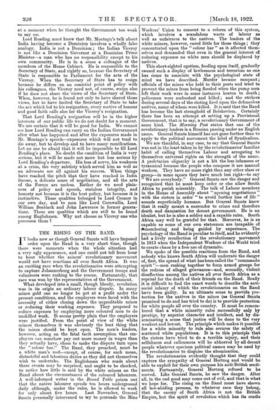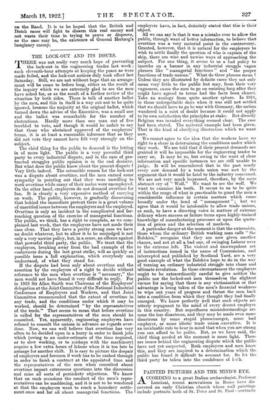THE RISING ON THE RAND.
IT looks now as though General Smuts will have imposed order upon the Rand in a very short time, though there were moments when the whole situation had a very ugly appearance, and one could not tell from hour to hour whether the miners' revolutionary movement would not have reactions all over South Africa. It was an exciting race when the revolutionaries were attempting to capture Johannesburg and the Government troops and volunteers were rushing to the rescue. Fortunately, that race was won by the representatives of the Government.
What developed into a small, though bloody, revolution was in its origin an ordinary labour dispute. In many mines gold can no longer be got at a profit under the present conditions, and the employers were faced with the necessity of either closing down the unprofitable mines or reducing their working expenses. They proposed to reduce expenses by employing more coloured men to do unskilled work. It seems pretty plain that the employers were justified. From the point of view of the white miners themselves it was obviously the best thing that the mines should be kept open. The men's leaders, however, acting on the fatal tacit assumption that em- ployers can somehow pay out more money in wages than they actually have, chose to make the dispute turn upon the "colour bar." The Rand, they preached, must be a white man's reef—except, of course, for such ' mean, distasteful and laborious duties as they did not themselves wish to undertake. The Englishman who reads about these events may be surprised, and ought to be shocked, to notice how little is said by the white miners on the Rand about the circumstances of the coloured labourers. A well-informed writer in the Round Table points out that the native labourer spends ten hours underground daily although, under the rules, he is allowed to work for only about five hours. Last November, General Smuts personally intervened to try to persuade the Mine Workers' Union to consent to a reform of this system, which involves a scandalous waste of labour as well as unfairness to the natives. The leaders of the white miners, however, cared little for these things ; they concentrated upon the "colour bar" as it affected them- selves and demanded that even in the general interest of reducing expenses no white men should be displaced by natives.
This short-sighted egotism, feeding upon itself, gradually caused such a display of lawlessness and terrorism as one has Come to associate with the psychological state of mind we have described. Murder became rampant ; officials of the mines who held to their posts and tried to prevent the mines from being flooded when the pump men left their work were in some instances beaten to death ; policemen were ambushed and killed ; and the strikers during several days of the rioting fired upon the defenceless natives, many of whom were killed. It is said that the Rand has become the last stronghold of Bolshevism. Certainly there has been an attempt at setting up a Provisional Government, that is to say, a revolutionary Government of some kind. The Morning Post states that one of the revolutionary leaders is a Russian passing under an English name. General Smuts himself has not gone further than to apply to the political movement the label of Syndicalism.
We are thankful, in any case, to say that General Smuts was not in the least taken in by the revolutionaries' familiar habit of calling themselves Labour and arrogating to themselves universal rights on the strength of the name. A proletarian oligarchy is not a bit the less infamous or tyrannical because the people who compose it are manual workers. They have no more right than any other class or group—in some apses they have much less right—to say We are everybody." General Smuts saw the danger and recognized that he must keep order or else allow South Africa to perish miserably. The talk of Labour members in the House of Assembly about "opening negotiations" with the rioters in order "to avoid further loss of life " sounds superficially humane. But General Smuts knew that it really meant a surrender to crime and therefore death and damnation for decent government He is an idealist, but he is also a soldier and a capable ruler. South Africa may well be grateful for that. Moreover, he is as capable as some of our own statesmen are incapable of membering and being guided by experience. The psychology of the Rand is peculiar to itself, and he evidently had a lively recollection of the revolutionary movement in 1913 when the Independent Workers of the World tried to create chaos by a free use of dynamite. We spoke of the possible reactions from the Rand, and nobody who knows South Africa will underrate the danger of, first, the spread of what has been called the "commando spirit "—men rushing together to form armed groups for the redress of alleged grievances—and, secondly, violent disaffection among the natives all over South Africa as a reprisal for the death of their friends on the Rand. Really it is difficult to find the exact words to describe the anti- social infamy of which the revolutionaries on the Rand have been guilty. In an ultimate sense to provide pro- tection for the natives in the mines (as General Smuts promised to do and has tried to do) is to provide protection for white people all over the country. It must be remem- bered that a white minority rules successfully only by prestige, by superior character and intellect, and by dis- seminating a sense that justice will be done to the very weakest and lowest. The principle which makes it possible for a white minority to rule also secures the safety of scattered white populations. It is to this principle that the rioters have tried to do a terrible injury, and their selfishness and callousness will be abhorred by all decent people whatever specious political names may be used by the revolutionaries to disguise the abomination.
The revolutionaries evidently thought that they could capture the sympathy of General Hertzog and would be able to exploit for their own purpose his anti-British senti- ments. Fortunately, GeneralWertzog refused to be moved. Like General Smuts, he saw the danger. After all, in the end good may come out of evil, and that is what we hope for. The rising on the Rand must have shown all law-abiding persons, to whatever race they belong, that the enemy of South Africa is not the British Empire, but the spirit of revolution which has its cradle on the Rand. It is to be hoped that the' British and Dutch racer will fight to disarm this real enemy and not waste their time in trying to prove or disprove, as the case may be, the existence of General Hertzog's imaginary enemy.



































 Previous page
Previous page